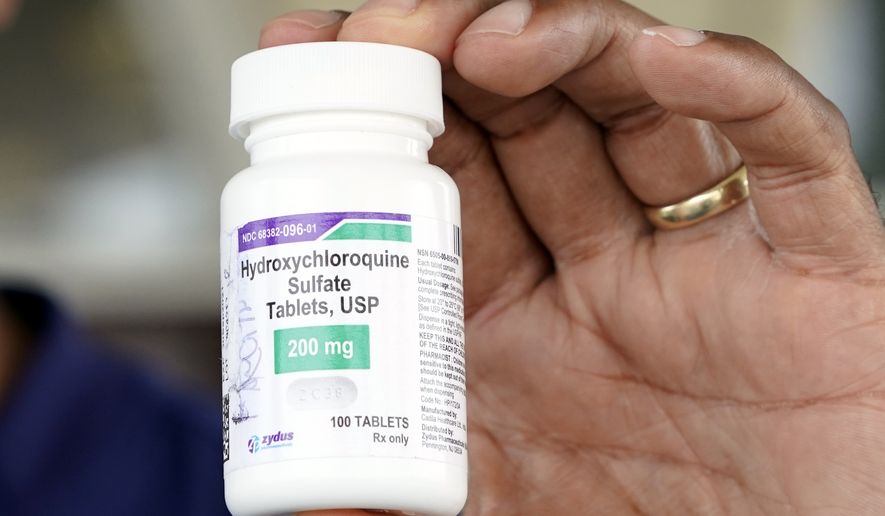The National Institutes of Health on Tuesday recommended against using hydroxychloroquine and azithromycin, a drug combination touted by President Trump, together to treat the novel coronavirus, citing the “potential for toxicities.”
The combination of the antimalarial drug and the antibiotic, which goes by the brand name Z-Pak, has been frequently cited for treating patients with COVID-19, although no clinical trials have been conducted and so far the evidence of its effectiveness is anecdotal.
NIH had no recommendation on prescribing hydroxychloroquine without azithromycin, but said that there are “insufficient clinical data to recommend either for or against using chloroquine or hydroxychloroquine for the treatment of COVID-19.”
“Although reports have appeared in the medical literature and the lay press claiming successful treatment of patients with COVID-19 with a variety of agents, definitive clinical trial data are needed to identify optimal treatments for this disease,” said the NIH treatment guidance.
There are no FDA-approved drugs for treating the coronavirus, although the FDA has issued an emergency-use authorization for chloroquine and hydroxychloroquine, its next-generation version, in treating the infection.
Mr. Trump has been hotly criticized after recommending the treatment. In a March 21 tweet, he said that the drug combination had “a real chance to be one of the biggest game changers in the history of medicine.”
Some doctors and patients have reported encouraging results. Actor Daniel Dae Kim said he recovered from COVID-19 last month after being treated with Z-Pak and hydroxychloroquine [HCQ], which he called his “secret weapon.”
Dr. Stephen Smith, head of the Smith Center on Infectious Diseases and Urban Health, has championed the combination of HCQ and Z-Pak, saying that none of his COVID-19 patients undergoing the drug regimen for five days or more needed to be placed on a ventilator.
“I think this is the beginning of the end of the pandemic. I’m very serious,” Dr. Smith told Fox’s “The Ingraham Angle” in an April 2 interview, adding that he had treated 72 patients with the drug combo.
#NIH issued treatment guidelines for #COVID19. The Guidelines, developed by an expert US panel, are intended to help healthcare providers on the frontlines fighting COVID-19. Posted online, they will be updated often as new data & information emerges. https://t.co/CrLz1x2LXs pic.twitter.com/Y5ACYYsw7s
— NIH (@NIH) April 21, 2020
Hydroxchloroquine and Z pack video worth watchinghttps://t.co/r0foQEetWP
— Heath Hall (@HeathHall78) April 20, 2020
Others have been less impressed. A small study posted Tuesday by University of Virginia researchers found a higher mortality rate among 368 male veterans treated with hydroxychloroquine at Veterans Administration medical centers.
“In this study, we found no evidence that use of hydroxychloroquine, either with or without azithromycin, reduced the risk of mechanical ventilation in patients hospitalized with Covid-19,” said the abstract in the journal medRxiv. “An association of increased overall mortality was identified in patients treated with hydroxychloroquine alone.”
The nationwide study, which has not been peer-reviewed, represented the largest analysis so far of hydroxychloroquine, with or without azithromycin, in treating the virus.
The novel coronavirus has killed more than 45,000 in the United States and more than 177,000 worldwide.
NIH recommended monitoring patients using hydroxychloroquine has been FDA-approved for decades for malaria, lupus and rheumatoid arthritis, for possible cardiac complications from a condition known as prolonged QTc interval.
• Valerie Richardson can be reached at vrichardson@washingtontimes.com.




Please read our comment policy before commenting.